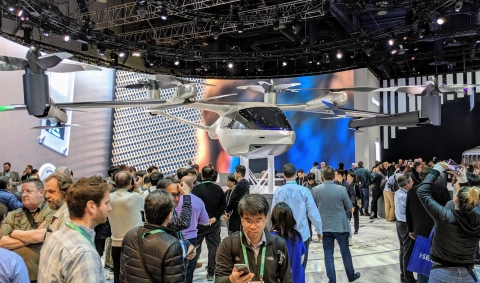Fresh off a Successful 2020 Show, Massive CES Is Ready for More Space

Bendable laptop screens, 5G connectivity and a Mercedes straight out of Avatar were only some of the highlights at CES 2020 that took place Jan. 7-10 in Las Vegas.
The 54th annual show attracted around 180,000 attendees and showcased the latest in tech from 4,400 exhibitors across more than 2.9 million square feet at the Las Vegas Convention Center, Sands Expo and several Las Vegas hotels.
Already the largest show in the U.S. (and the top show on TSNN’s Top Trade Show List), CES will have room to grow next year with the addition of the new West Hall at the Las Vegas Convention Center.
“The LVCC expansion is critical to the growth of CES and ensures we will have state-of-the art facilities and space to grow strategically as more non-traditional verticals are incorporated into the show,” said Caroline Finnell, senior coordinator, events communications for CES. “CES 2021 will be the first show in the new space.”
The West Hall will house the overall vehicle tech/transportation category, which includes automotive technology, car audio, drones and self-driving cars. Space selection for the 2021 show began last week.
Highlights of CES 2020
In the meantime, CES 2020 saw strong growth in several sectors, highlighting their importance to the changing marketplace.
The health and wellness category featured 135 exhibitors, a 25 percent increase over last year. The Consumer Technology Association, which owns and operates CES, partnered with World Bank Group for the show on a Global Tech Challenge, which — among other areas — focused on health tech, such as and electroencephalogram headband and clinically validated healthwatches.
The Smart Cities exhibit area also saw a 25 percent growth compared to last year. In her keynote, U.S. Secretary of Transportation Elaine Chao addressed the importance of safe integration of autonomous vehicles into the country’s transportation system and other tech advancements that are impacting public transport. Her sentiments where echoed on the showfloor, where crowds also got a glimpse of the future with a flying taxi by Bell.
CES is always a showcase for incredible exhibit design. Audi created an intimate and futuristic experience around its Audi AI:Me “empathetic” car by using colorful, shimmering streamers hanging from the ceiling of the booth. Canon let attendees test out the latest cameras on a fabulous catwalk, and Google added interactivity to its Assistant presentations with a ride down a slide.
At the Delta Air Lines booth, attendees could lift heavy luggage with the help of an exoskeleton and experience “parallel reality,” where two people can look at the same object and see their own personalized information. The company also announced its plans for in-flight free Wi-Fi at CES.
With AI at the core of many products at CES, it was only fitting that the show itself used AI to improve attendee experience through using facial recognition for badge pickup at several locations. The CES app, as well as its Facebook and Twitter pages, featured AI-powered chat bots to provide real-time information on sessions and exhibitors to attendees.
CES 2021 will take place on Jan. 6-9 in Las Vegas.
Don’t miss any event-related news: Sign up for our weekly e-newsletter HERE and engage with us on Twitter, Facebook, LinkedIn and Instagram!


Add new comment